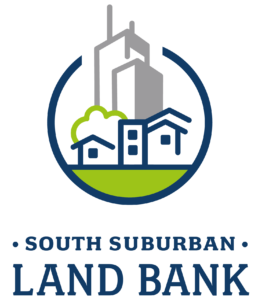What was once a sleeping giant has transformed into exponential growth and the two best years in the history of the South Suburban Land Bank & Development Authority (SSLBDA).
It was the first land bank in Illinois, but it almost didn’t survive. The SSLBDA, a public agency, includes 29 member cities and villages in the Chicago Southland. Those communities work together to activate vacant, abandoned, and financially distressed properties. However, for many years after its inception in 2012, the SSLBDA itself was the entity in distress.
“There was a period of time where it didn’t have an Executive Director in charge,” said Joe van Dyk, the Executive Director who has overseen the organization’s turnaround. “The Land Bank was under-resourced for a really long time.”
The Land Bank, which was organized by the South Suburban Mayors and Managers Association in 2011, started with three charter members between Blue Island, Oak Forest, and Park Forest. In those early days, the public agency was funded by grants, including an initial grant from the U.S. Department of Housing and Urban Development. But as it would soon learn, that funding wouldn’t be enough to sustain itself.
For an entire decade, the SSLBDA struggled with inconsistent leadership,voids in administration, and a lack of sustained organization. These issues led to an ever-worsening financial situation. From 2016 to 2020, the SSLBDA’s property sales net income was -$570,292. From that alone, it became clear that something had to change.
The Intervention: Partnership With the SDA
By 2021, van Dyk said the Land Bank sought the SDA’s resources for consistent administration and direction. Soon after, a strategic partnership was set up leveraging the Land Bank’s property management expertise and the SDA’s development capabilities. The agreement included asset management, program execution, securing funding, and community planning.
Simply put, it said: “We’re going to staff it and run it well,” reflected van Dyk, emphasizing that initial commitment to building standard processes.
The SDA’s four-phase plan first aimed to establish stability. According to van Dyk, the organization didn’t have an official director for several months, so the SDA appointed one. Jeff Allen took over on a part-time basis, quickly accumulating a backlog of old properties the Lank Bank had in its name. Allen started with those, selling as many as he could. This alone resulted in the best year the Land Bank ever had, both in terms of properties sold and in terms of overall revenue attainment.
“He kept the train running on time,” said van Dyk, who took over soon after in January of 2023. van Dyk advanced the plan to its second and third phases: standardizing operations and scaling up. The SDA established a database, set up a realty process, and hired realtors. “There wasn’t an element of the Land Bank that wasn’t touched,” said van Dyk.
The immediate results were astounding. By 2023 alone, the Land Bank reactivated a whopping $452,816 in property tax revenue, reducing property crime rates in the process, and breathing new life into its 29 member communities. A stunning turnaround that took only two years. Amazingly, this was only just the beginning.
The Turning Point: Scaling Up
Merely two months into 2024, the remarkable turnaround had already turned into something much more—with exponential growth well underway. “Already, I think we’ve exceeded a quarter of our total sales numbers from last year, just in January and February,” stated van Dyk. He anticipates the Land Bank will soon be able to rehabilitate its own houses, rather than just selling all of them.
Under van Dyk’s leadership, there are also plans to help first-time homeowners buy at favorable rates directly from the Land Bank, which boasts an increasingly diverse portfolio of properties. That diverse portfolio suddenly includes industrial properties and an office building, as well, “Which is new ground for the Land Bank,” said van Dyk.
2024 will see continued implementation and perfection of the SSLBDA’s central data system, an updated digital presence, and fresh faces on its staff—with possibilities for a Real Estate Director, a Land Bank Coordinator, and a Planner. The Land Bank is also considering establishing community land trusts and a variety of community-focused programs. Consistent community engagement has been a driving force of van Dyk’s leadership: “We work closely with our city and village partners,” he said.
According to the SSLBDA, every dollar the Land Bank spends to reactivate vacant property now generates an additional $4.42 in economic activity in the communities it serves. “For every dollar we put in, we get four dollars back in impact and we can spend that on other properties,” said van Dyk. It took 14 years to get to this point, but the Land Bank stayed on its feet, survived a decade-long dark period, and emerged from the shadows stronger than it’s ever been.
For more information on the SSLBDA, including how to join its growing list of member communities, go to: https://www.sslbda.com/
About Southland Development Authority
The Southland Development Authority is a nonprofit business organization launched in 2019 by business, civic, and political leaders from around the Southland who recognize the potential of the region’s people, businesses, and real estate. Our mission is to bring the resources and capacity needed to achieve transformative, inclusive economic growth for the south suburbs with a focus on investments in the Southland’s communities, industry, housing, and workforce.
We work steadfastly to connect Southland business owners, investors, and individuals with key resources to operate and thrive in the region, from equipping mid-size and small businesses in our Business Growth services Program with customized advice and consulting services, to helping local residents access the tools needed to pursue their entrepreneurial dreams. With a deep institutional knowledge of the Southland’s people, markets, and history and our multifaceted, experienced team, the Southland Development Authority is a powerful partner for any individual, business, or investor.


